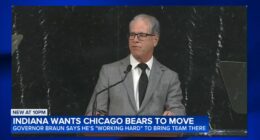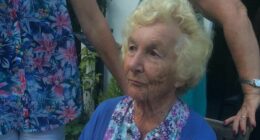Share this @internewscast.com
SBS News recently engaged in discussions with experts in cyber technology and workforce development to explore the reasons behind the cautious approach towards AI and the potential opportunities it presents for Australian workers.
Just a few years back, the concept of artificial intelligence was largely understood only through popular culture, with many people’s knowledge limited to depictions in movies like the 1984 classic, “Terminator.”
“There are numerous AI systems, and they essentially function as highly sophisticated prediction machines. They work by figuring out what actions you want them to take or what tasks you direct them to perform,” an expert shared with SBS News.
AI technology empowers the automation of routine business tasks, which were traditionally carried out manually, enhancing efficiency in various operations. Source: Getty / NurPhoto

According to Tuffley, businesses are increasingly implementing AI to automate processes that were previously handled by people, utilizing what’s known as agentic AI.
“This approach leverages AI as an agent to perform tasks. It involves assembling various AI components, similar to building with Lego bricks, to create a functional workflow. This workflow is advanced enough to make expert decisions based on the specific situation,” Tuffley explained.
So, which workers could be impacted by AI?
“The survey data suggest that the future trajectory of the Australian jobs market is nuanced and uncertain,” McCann-Bartlett said.
Dixon also noted the modelling assumed the government would take a passive approach to how AI is adopted.
These were general clerks, receptionists, accounting clerks and bookkeepers, sales, marketing and public relations professionals, as well as business and systems analysts, and programmers.

Jobs and Skills Australia’s report listed five occupation types most likely to experience job losses due to AI. Source: SBS News
In terms of industries that may lose the most jobs, the report highlighted retail trade, public administration and safety, financial and insurance services, professional, scientific and technical, and rental, hiring, and real estate.
“The kind of Luddites who just refuse to engage with the technology, they won’t lose their jobs immediately, but over time they’ll become less and less useful employees,” he said.
Turning AI into opportunity
She said the modelling suggested “potential expansions in areas such as a lot of the trades, a lot of the caring occupations, those hands-on and face-to-face occupations”.

The Jobs and Skills Australia report forecast employment growth in the construction industry, as well as accommodation and food services, manufacturing, education and training, and agriculture, forestry and fishing. Source: SBS News
The Jobs and Skills Australia report forecast employment growth in the construction industry, as well as accommodation and food services, manufacturing, education and training, and agriculture, forestry and fishing.
“To put it bluntly, it is going to make people redundant, but it is going to make existing businesses more efficient and therefore more profitable.”
The Jobs and Skills Australia report urged the government to take the lead in steering the transition to a Gen AI-enabled labour market and to enhance AI capability across the entire population.
Unions warn AI could threaten workers
In a significant shift, it confirms Australia will not introduce mandatory guardrails for high-risk AI, instead relying on existing laws and minor adjustments where needed, supported by a new $30 million AI Safety Institute within the Department of Industry.

The Jobs and Skills Australia report urged the federal government to take the lead in steering the transition to a Gen AI-enabled labour market. Source: NurPhoto / NurPhoto via Getty Images
Australian Council of Trade Unions assistant secretary Joseph Mitchell welcomed parts of the plan but warned workers remain wary of AI’s impact on jobs.
“Workers are tired of being told by large tech companies that AI will bring improvements in the far distant future, when our rights and our jobs are under threat right now,” Mitchell said.
The AI era: Jobs we can’t yet imagine
“You don’t know exactly what these new industries are going to look like, but what we do know is that in the history of technology, every new step forward like this, like the industrial revolution, which created a lot of new jobs that only 10 years earlier, no-one could have predicted what they would be,” he said.
“So what I am sure will see is, in the coming decade or more, we’ll see AI being used to create whole new categories of products that don’t exist yet and I can’t really say what they’ll be, because that’ll be the brainchild of some clever entrepreneur,” he said.
What workers can do to prepare
Kai Riemer, a professor of information technology and organisation at the University of Sydney, suggested workers learn and experiment with AI to get the most out of it.












